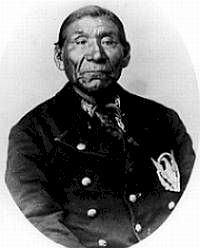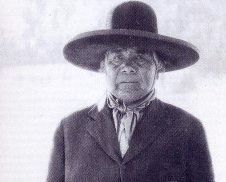A Project of the Idaho GenWeb
Northern Paiute Chiefs and Leaders
Bannock Nez Percé Paiute (Northern) Salish Shoshoni (Northern) Shoshoni (Western) Snake Spokane
He was chief of an Indian nation called the Piute and before any white men came over the Rocky Mountains to disturb them, there were several thousand Indians, to whom he was like a father. He saw to it that they had plenty of good food to eat, nice furs and skins to wear, and handsome tepees (or wigwams) for their families to live in. He had a good wife and many children of his own; he was always very kind to them, and took much pains to teach all he himself knew to his eldest son, who was to be Chief Winnemucca after him.
Chief Winnemucca, also called Poito or One Moccasin (ca. 1820–1882), was an important chief of the Northern Paiute at the time of the Paiute War of 1860. He is primarily known through the writings of his daughter, Sarah Winnemucca. His birth date is unknown, but was probably around 1820.
Winnemucca has been translated as The Giver. This name is part-English and part-Paiute His role in Northern Paiute politics is difficult to determine, and somewhat controversial. Sarah Winnemucca stated that he was the chief of all the Northern Paiute, and due in large part to her role as a translator this viewpoint was shared by contemporary whites. Modern historians and ethnologists view him more as a "first among equals", with considerable influence over the bands in the Pyramid Lake region.
Chief Winnemucca taught the Piute very different lessons from other Indian chiefs; for example, to love peace and make constant effort to keep it; always to be kind one to another; always to tell the truth, and never to take for one's self what belonged to another; to treat old people with tender regard; to care for and help the helpless; to be affectionate in families and show real respect to women, particularly to mothers; yet he and his Piute had no books, no writing, no chairs, no furniture, almost none of those common articles that make our houses so comfortable. Chief Winnemucca, from time to time, had wonderful dreams. One night he dreamed that some people who were different from the red men, would by and by come from the east; that they would be finer people than any he had ever seen, and that their faces would he of a white color, bright and beautiful. He stretched out his hands toward them and, said: "My white brothers!"
Beside the beautiful lake he lived for many years, and when at last he was about to pass over to the Happy Land he called his son to him and told him never to forget his duty to his own people and to love and always be kind to his white brothers.
The San Francisco Chronicle reported that Winnemucca died in October 1882 at Coppersmith Station, Nevada. It further reported that his death was attributed to his being bewitched by his young wife, who was then stoned to death along with their three-year-old child.
Copyright Idaho Indian Tribes Project 2009-2014





